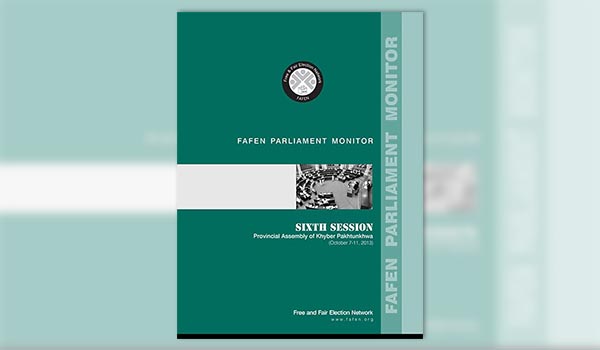 The sixth session of the Khyber Pakhtunkhwa Assembly witnessed the introduction of two important government bills on the local government system and the establishment of an accountability commission, amidst government and opposition walkouts.
The sixth session of the Khyber Pakhtunkhwa Assembly witnessed the introduction of two important government bills on the local government system and the establishment of an accountability commission, amidst government and opposition walkouts.
The Khyber Pakhtunkhwa Local Government Bill, 2013 provides for holding the local government elections on party basis at district and tehsil council levels while the village council will be elected on non-party basis. The new local government system will do away with the concept of union council and village councils will be introduced. According to the bill, the task of delimitation, which will start after the legislation is passed, will take two months.
Also laid during the proceedings, the Khyber Pakhtunkhwa Ehtesab Commission Bill 2013 seeks to provide for the “establishment of the Khyber Pakhtunkhwa Ehtesab Commission, for good governance and to create an effective institutional structure for the prevention of corruption and corrupt practices and to hold accountable all public office holders, accused of such practices.”
The provisions of the bill will extend to all public office holders performing their functions in connection with the affairs and the employment of government funds in the province. Once the bill comes into force, an Accountability commission comprising five commissioners nominated by the search and scrutiny committee would be established within 30 days to overcome corrupt practices.
As the Standing Committees have still not been formed in the Khyber Pakhtunkhwa Assembly, the two bills were sent to select committees for review.
The opposition and government staged five walkouts consuming 63 minutes – 8% of the session time. Women MPAs from the treasury and opposition benches walked out from the last sitting over the alleged discrimination in the allocation of funds. Similarly, a PML-N lawmaker protested the delay in action on a privilege motion against the Secretary Local Government.
Two Joint walkouts were over the transfer of district police officer, Mansehra; the opposition members not given the chairmanship of District Development Committees and the issue of political transfers and appointments of teachers in Buner. Additionally a PTI lawmaker staged a 16 -minute walkout when the Speaker disallowed him to speak.
The House adopted a single resolution calling upon the provincial and federal governments for the dissolution of ERRA and allocation of the funds for the rehabilitation of the 2005 earthquake victims to the provincial government. The resolution was jointly sponsored by legislators of PTI, PML-N and JUI-F.
From October 7-11, 2013, the sixth session met for 13 hours and 25 minutes. Each of the four sittings on average lasted three hour and 21 minutes. Thirty-one percent of the session’s time was consumed in four breaks.
The Speaker was absent throughout the session whereas the Deputy Speaker presided over the entire session. The Chief Minister was present in the first sitting only while the Leader of Opposition attended two sittings.
FAFEN observed that members’ attendance remained low during the session. On average, there were 31 members at the outset and 48 at the time of adjournment of the sittings. Lack of quorum was pointed out four times by the JUI-F and PPPP legislators during the brief session.
The House took up all of the ten calling attention notices tabled in the session. Five of them were sponsored by JUI-F members. The rest of the notices were moved by the legislators of PPPP, PML-N, PTI, JI and ANP. Among other issues, the notices were related to education, toy weapons, health, finance and employment.
A total of 13 reports were presented in the fourth sitting of the session. Of them, 12 were the annual reports of the Council of Islamic Ideology from 1997 to 2009. The other report was about the Khyber Pakhtunkhwa Public Service Commission for the year 2010.
Two members debated the sole adjournment motion of the session for seven minutes. Tabled by an ANP member, the motion was on the delay in work of power generation in Machai district, Mardan after a no objection certificate (NOC) has been granted for this purpose.
For complete report, please click here








